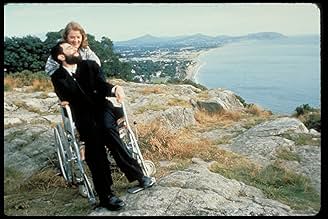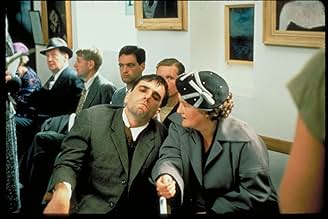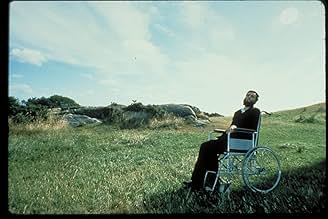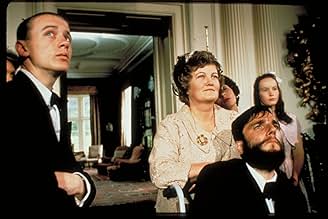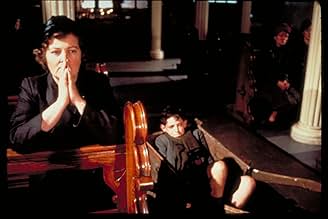Christy Brown, born with cerebral palsy, learns to paint and write with his only controllable limb - his left foot.Christy Brown, born with cerebral palsy, learns to paint and write with his only controllable limb - his left foot.Christy Brown, born with cerebral palsy, learns to paint and write with his only controllable limb - his left foot.
- Director
- Writers
- Stars
- Won 2 Oscars
- 23 wins & 20 nominations total
Pat Laffan
- Barman
- (as Patrick Laffan)
Owen Sharpe
- Young Tom
- (as Owen Sharp)
- Director
- Writers
- All cast & crew
- Production, box office & more at IMDbPro
Featured reviews
'My Left Foot' is the remarkable story of Christy Brown, born into a working-class Irish family with cerebral palsy. Growing up in a life full of poverty and extreme prejudice, Christy defied everyone's expectations. Using his left foot, the only part of his body he had proper control over, the young man learned to write and paint.
I could spend this review talking about the film's excellent portrayal of working class Ireland, and the working class Irish family specifically. I could talk about how the film does a good job of showing how the attitudes towards Christy Brown changed as Ireland's own political landscape changed. I could probably also talk about the role of women in Christy's life, from his mother and sisters, to the loves in his life. All of these things are worthy of mention.
However, when talking about 'My Left Foot', there is one thing that stands out above everything else; that being Daniel Day-Lewis. Day-Lewis had already proved his acting chops in the excellent 'My Beautiful Laundrette, but it was this movie that put him on the map globally. And rightly so: he is absolutely fantastic as Christy Brown.
Acting is difficult at the best of times, when you're playing a fully-functioning human being. What Day-Lewis achieves, therefore, is even more admirable. It is an extremely effective and realistic portrayal of someone suffering from cerebral palsy, and the actor goes gung-ho with both the physicality expressiveness required for the role. It is a joy to watch.
An honourable mention also needs to go to Hugh O'Conor, who plays the younger Brown. I can only assume that it is even harder for a child to go through the rigours that the role requires, but O'Conor is brilliant. What makes the character difficult to play is that, in trying to make it look real physically, the emotion required can be lost. Both actors avoid that problem with what seems like relative ease: at no point does the efficacy or emotion of the moments falter.
All the other stuff mentioned above are worthy of talking about, if I intended to write a longer review. But for this small thing, I think it is more than enough to say that 'My Left Foot' deserves to be seen just for this landmark Daniel Day-Lewis performance. Whatever you may think of the film as a whole, or whether you care about the story of Christy Brown or not, it is secondary to the simple appreciation for an actor at the top of his game.
I could spend this review talking about the film's excellent portrayal of working class Ireland, and the working class Irish family specifically. I could talk about how the film does a good job of showing how the attitudes towards Christy Brown changed as Ireland's own political landscape changed. I could probably also talk about the role of women in Christy's life, from his mother and sisters, to the loves in his life. All of these things are worthy of mention.
However, when talking about 'My Left Foot', there is one thing that stands out above everything else; that being Daniel Day-Lewis. Day-Lewis had already proved his acting chops in the excellent 'My Beautiful Laundrette, but it was this movie that put him on the map globally. And rightly so: he is absolutely fantastic as Christy Brown.
Acting is difficult at the best of times, when you're playing a fully-functioning human being. What Day-Lewis achieves, therefore, is even more admirable. It is an extremely effective and realistic portrayal of someone suffering from cerebral palsy, and the actor goes gung-ho with both the physicality expressiveness required for the role. It is a joy to watch.
An honourable mention also needs to go to Hugh O'Conor, who plays the younger Brown. I can only assume that it is even harder for a child to go through the rigours that the role requires, but O'Conor is brilliant. What makes the character difficult to play is that, in trying to make it look real physically, the emotion required can be lost. Both actors avoid that problem with what seems like relative ease: at no point does the efficacy or emotion of the moments falter.
All the other stuff mentioned above are worthy of talking about, if I intended to write a longer review. But for this small thing, I think it is more than enough to say that 'My Left Foot' deserves to be seen just for this landmark Daniel Day-Lewis performance. Whatever you may think of the film as a whole, or whether you care about the story of Christy Brown or not, it is secondary to the simple appreciation for an actor at the top of his game.
10llltdesq
Let me state at the outset that I have Cerebral Palsy and I went into this film expecting to have to make allowances for the lead performance. I left the theater half-convinced that they'd cast an actor who had Cerebral Palsy in the role, even though I knew that was not the case. The performances were generally excellent, with a special nod to Brenda Fricker and to Hugh O'Conner (I believe that's his name) as the young Christy Brown. Christy is talented, brash, arrogant, at times vulgar and petulant-in other words, human. This film, along with Gaby: A True Story and the documentary King Gimp, are excellent portrayals of life with CP. By no means a complete portrait, but fine examples of the disabled as human beings. Most highly recommended.
Christy Brown is born with cerebral palsy. His father (Ray McAnally) refuses to give him up and he learns to live with controlling only his left foot. His loving mother (Brenda Fricker) tirelessly raise him. As a child (Hugh O'Conor), everybody assumed that he's a simpleton until he wrote MOTHER with chalk. As a young man (Daniel Day-Lewis), he is rejected by the pretty girl. His father loses his job and becomes abusive. He falls for Dr. Cole (Fiona Shaw) treating his cerebral palsy but she's engaged. As an older man, he falls for his nurse Sheila (Alison Whelan).
It's a tough way to act for Daniel Day-Lewis. It's not just the physicality but he has to make sense despite his speech pattern. He has to be understandable without speaking understandable English. It's his anger and his unlikeability that brings out his humanity. He's not playing a saint or a caricature. It's a real person. It's an all-around performance.
It's a tough way to act for Daniel Day-Lewis. It's not just the physicality but he has to make sense despite his speech pattern. He has to be understandable without speaking understandable English. It's his anger and his unlikeability that brings out his humanity. He's not playing a saint or a caricature. It's a real person. It's an all-around performance.
I can still remember the fuss that was made when this movie was first released. Everybody was applauding it. 14 years down the line the film is very dated, but still very enjoyable but more importantly very powerful. The story centers around Poet, artist and author to be Christy Brown. He suffers from Celerbal Paulsy (I hope that is spelled right) which means to be all three of the above occupations is some feat that should not go unnoticed. He lives in a large family (13 children, not all who suffered) in a small terraced house in Dublin's City Center. The movie begins with his birth and the late great Ray Mc Nally being told by a nurse that there were complications during the birth. We move forward a couple years to where we see a young Christy (played by Hugh O'Connor) being helped around by his mother. It is a sad sight to see him underneath the stairs of his family home watching his brothers and sisters (all Abled bodied) living a normal lifestyle (despite being poor) and knowing that he is just as well able to communicate. The finest scene in this early stage of his life is when Christy writes for the first time. In front of his family. His father is sceptical at first however his opinion is reversed when Christy finally proves that he is not the idiot that everybody thinks him to be. We then move to Christy's later teenage years where he meets a nurse with whose help he begins to learn how articulate his words. However Christy becomes infatuated with this lady. His mother is delighted that her son is happy however his father is once again the sceptic but this time he has good cause to as Christy's heart is broken when this woman announces that she is engaged to an Art dealer. This film is brilliant and I have a massive amount of praise for Daniel Day-Lewis who portrays Christy as an angry young man who is coming to terms with everything in his life. He is disturbed by womens reluctance to accept him and his condition, He is fed up of his fathers treatment of his mother and his siblings. Day-Lewis is totally immersed in his character and it is one of his finest roles. I have seen old interviews with the real Christy Brown and I can safely say that it is hard at times to distinguish is it Christy Brown or Daniel Day-Lewis on the screen. However the show is stolen from him by the finer performances of young Hugh O'Connor and Ray Mc Nally. Both of whom should have got Oscars as Best Supporting Actor (O'Connor) and Best Actor (Ray Mc Nally). O'Connor definitely proves himself in the role because he portrays the same qualities that Day-Lewis does as a frustrated youngster. Mc Nally defines the typical Irish Father role that would be made humorous by Colm Meaney in a number of films. It is such a great pity that he died shortly after this film. Brenda Fricker must also be mentioned as the doting mother who does everything that she can to help Christy reach his full potential. Again she is life like to Christy Browns real life mother however I think there were more deserving people for that Best Supporting Actress Oscar. This film is an amazing piece of independent film making and it really does so the potential of Jim Sheridan as a director and actor. He would further develop the themes of family, Irish society, loyalty in his other films. 9 out of 10.
Daniel Day-Lewis' almost impossible performance as a man with cerebral palsy earned him a well-deserved Oscar in 1989 for Best Actor over the heavily favoured Tom Cruise in 'Born on the Fourth of July' and Morgan Freeman in 'Driving Miss Daisy'. The Academy was still riding the wave of awarding Dustin Hoffman a second Best Actor prize a year earlier for his performance as a mentally challenged individual in 'Rain Man' and since Day-Lewis' performance was superior to Hoffman's, the Academy had to recognize him. Day-Lewis probably would have won anyway as his performance was hard to ignore and he had never received any acting nominations from the Academy before this film despite turning in great work in such films as 'The Unbearable Lightness of Being' and 'My Beautiful Laundrette.'
As Christy Brown, Daniel Day-Lewis makes his character unsympathetic as he doesn't want you to feel sorry for him. He achieved the great success of being an accomplished writer and artist. Director Jim Sheridan directs the film like a series of home movies that millions want to see.
Brenda Fricker won the Oscar as Best Supporting Actress as Brown's mother and she is the real moral centre of the film and this film proves that Hollywood is capable of choosing small, lesser known films for Oscar consideration and 'My Left Foot' is a film that is uplifting without being sentimental.
As Christy Brown, Daniel Day-Lewis makes his character unsympathetic as he doesn't want you to feel sorry for him. He achieved the great success of being an accomplished writer and artist. Director Jim Sheridan directs the film like a series of home movies that millions want to see.
Brenda Fricker won the Oscar as Best Supporting Actress as Brown's mother and she is the real moral centre of the film and this film proves that Hollywood is capable of choosing small, lesser known films for Oscar consideration and 'My Left Foot' is a film that is uplifting without being sentimental.
Did you know
- TriviaAccording to the "Making of My Left Foot" segment on the Special Edition DVD, Sir Daniel Day-Lewis broke two ribs during filming from assuming the hunched-over position in his wheelchair for weeks of filming. He also would refuse to come out of character. On visits to the set canteen, other people would have to help him with food. On one visit from his English agent, Day-Lewis again refused to come out of character as Christy Brown, and his frustrated agent took off.
- GoofsIn the beginning of the movie, when Mary Carr gets Christy Brown into the library, the shadow of the boom mic can clearly be seen on a white door.
- Quotes
Christy Brown: I've had nothing but Platonic love all me life. Do you know what I say? FUCK PLATO! And fuck all love that's not a hundred percent commitment!
- SoundtracksFoggy Dew
(uncredited)
Traditional
- How long is My Left Foot?Powered by Alexa
Details
- Release date
- Countries of origin
- Official sites
- Language
- Also known as
- Mi pie izquierdo: la historia de Christy Brown
- Filming locations
- Production companies
- See more company credits at IMDbPro
Box office
- Budget
- £600,000 (estimated)
- Gross US & Canada
- $14,743,391
- Opening weekend US & Canada
- $41,165
- Nov 12, 1989
- Gross worldwide
- $14,743,391
Contribute to this page
Suggest an edit or add missing content



